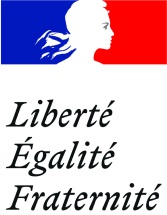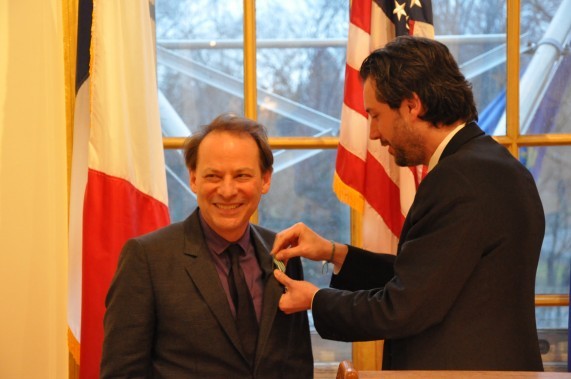On March 11, 2013, Adam Gopnik received the insignia of Chevalier of the Order of Arts and Lettres at the Cultural Services of the French Embassy in New York. Antonin Baudry, Cultural Counselor of the French Embassy in the United States, presided over the ceremony and delivered the following speech.
____________________________________
Dear friends,
Tonight we have a new champion. And as we are a old and romantic country, we always want our champions to be real knights.
I assume that this is why Andre Malraux created this award, the Ordre des Arts et des Lettres in 1957, in order to celebrate not only French people, but also foreigners who change the world through writing and creating art and culture. Actually, this award seems to have been created just for you, dear Adam Gopnik.
And I’m happy to have the occasion tonight to say this not only to you, but also in the presence of your wife Martha, your adorable children Luke and Olivia, and your godfather Malcom Eisenberg, who is also a perfect Francophile! and all your friends who came here to show their admiration and support.
Dear Adam, if there was only one word to perfectly epitomize the depth of your talent, I regret to say that this word would be a French one.
(You should not be surprised as you are pretty familiar now with our traditional national modesty…)
In any case, dear Adam, I thought about it during all weekend, and I think that this word would be: “plume”.
Plume is a weird word. It means feather – of a bird – which was used to write, in the time when there were knights in shining armor. And, as a metonymy, plume became the word for a writer. But not every writer. Only those who find their own style, their own vision and their own light. Montaigne is a plume, Whitman is a plume, Proust is a plume, but, say, Donald Trump : not a plume. And Gopnik is a plume. A very accurate one, who created his own method to approach the truth and to describe the world. You say, in “Paris to the Moon” (I love this book) : “ I have an inability to generalize”. And, a few pages later, you explain : “ I looked for the large in the small, the macro in the micro, the figure in the carpet, and if some big truths passed by, I hope some significant small ones got caught”.
And these truths do get caught a lot – and they get big.
But there are two unavoidable consequences to being a plume – I hope that it is not too heavy a burden for you.
The first is that you are now part of an important French literary tradition, and the second is that France declares you a knight.
In fact, you have a special gift for exploring the way we live. Tonight, we celebrate your Voltairian picture of France and of America. Your friend Eugenio Donato told you that your book about Paris is actually about New York. But you are so intellectually bilingual and filled with all nuances of French culture, that when you write about the US, it is also about the otherness – say France. You are Tocqueville’s contemporary counterpart – with your specific cards, such as irony, erudition and invention.
Adam, you were born in Philadelphia, but you moved to Canada when your parents, Irwin and Myrna, became professors at McGill University. Funnily, you were the only sibling of six not to attend a French school but as you say, after visiting your brother’s and sister’s French school : “you can never forget, I suppose, that the Champs-Elysées once led the way to the principal’s office”. Actually, you began reading French out of a desperate desire to know what the French papers were saying about the most important subject : the Montréal hockey team.
You graduated from McGill and NYU. In 1986, you started a twenty-year relationship with the New Yorker, which became and is (quote) “your home, your identity and your cause” and it’s been a long story of friendship and complicity with the one you call “your first reader and most patient one”, Henry Finder, who’s here with us tonight.
Since the beginning of your career as a journalist, you sharpen your eyes to see the specific light on each thing you consider, and sharpen your words to paint the picture. Arts are fundamentally at the core of your vision and in 1990, with your great teacher Kirk Varnedoe, you co-curated the important exhibition at MoMA called “High and Low : Modern Art and Popular Culture”. And because popular culture is something you value, you are able to avoid the professional jargon of the specialists, which is a rare talent.
From children’s literature to baseball, from Darwinism to Cézanne’s painting and Renaissance art, you write on an infinite number of subjects, with always the same ability to connect things and ideas which are seemingly disconnected. And when you write on politics and history, your vision and your morality never change, as when you deciphered the (quote) “Obama phenomenon” and the lessons, learned from the Second World War. And I must mention your most recent article on the Newtown massacre, which struck a deep chord with many of us.
When you decided to move to Paris with your wife and your baby, you explain that all your friends said : “ You can’t run away from (a) reality, (b), American culture, (c) yourself”. But what happened was the exact opposite of this doomed destiny : from 1995 to 2000, you described your life in France in the “Paris Journals”. And you eventually found yourself and your most accomplished style with these essays that became the bestseller Paris to the Moon. And this book also redefined American culture.
*
When you arrived back in the US, you remained addicted to France and are an exquisite painter of our cultural differences, with no excessive indulgence. I won’t resist quoting you again :
“The French believe that all errors are distant, someone else’s fault. Americans believe that there is no distance, no difference, and therefore that there are no errors, that any troubles are simple misunderstandings, consequent on your not yet having spoken loudly enough.”
Formidable ! as we often say – or as Americans often say we often say.
Since you are back in town, although participating actively in the intellectual sphere, hosting debates and giving speeches at the 92nd Street Y, the New York Public Library, NYU, Columbia, among other prestigious locations, you remain, I’m sorry to say, a French plume. Not only because you participated in last year’s symposium “Why French Matters?” at Columbia. You wrote the foreword to Jean Echenoz’s novel “Ravel” and to the American edition of Letters of Marcel Proust. And you have presented so many diverse French writers to the American public: from Jean-Marie Le Clézio to Muriel Barbéry, from Bernard-Henry Lévy to Marie Darrieussecq.
Most recently, you wrote a new book called The Table Comes First, which is one of my favorites. I admire how you shed light on the historical and philosophical relationship we have with our meals. In your eyes, (quote) “A modern meal is a drama unfolding between the opening Drink and the Concluding Coffee, with several acts passing between the libations.” This book opened my mind about the importance of all the culture and traditions included in the simplest act of eating. And I really admire you, as many others, for this reason : each time you consider a subject seemingly light, you extract deeper and more lingering ideas than so many writers who consider only noble subjects and big pictures.
Quoting Thomas More’s Utopia, I would say that you are “a man who drank deep in the spirit of his age”.
You have received countless awards, including the National Magazine Award for Essays and for Criticism which you won three times, and the prestigious George Polk Award for Magazine Reporting.
Please be aware that it is not my intention to make you look like a Soviet marshal, but I have the pleasure, dear Adam, to add a new item to this extensive list : the medal of Knight of the Arts and Letters.
Adam Gopnik, au nom du Gouvernement français, je vous fais Chevalier dans l’Ordre des Arts et des Lettres.



